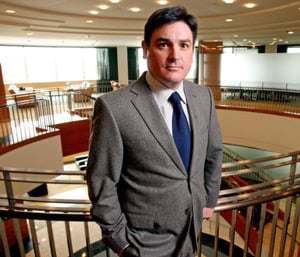
After seeing his name dragged through the mud over the past three years, it seems Michael Perry has had enough.
Blamed by many for IndyMac Bank’s billion-dollar losses and subsequent failure, the mortgage lender’s former chief executive has been vilified in the press and targeted in lawsuits by the Federal Deposit Insurance Corp., the Securities and Exchange Commission and numerous individuals.
Perry is now taking an unusually aggressive and public approach to quash what he calls “unwarranted and false” allegations over his role in IndyMac’s headline-grabbing 2008 collapse. After keeping quiet for years, he recently set up a website, NotTooBigtoFail.org. He uses the forum to defend his actions as head of the Pasadena thrift, offer his take on the causes of its failure and refute various allegations against him.
The bold move has turned heads in the normally buttoned-down financial services industry. James Barth, a Milken Institute senior fellow who has studied bank failures, said the executives associated with shuttered institutions typically avoid the spotlight.
“I don’t know of any executives who have set up a website,” Barth said, “especially during an ongoing legal proceeding.”
Perry is also fighting back through traditional means: Next week, his lawyers plan to ask a federal judge to dismiss the FDIC’s lawsuit, which seeks $600 million in damages.
Perry did not comment for this article, but his lawyer, Jean Veta, issued a statement to the Business Journal. Perry set up the website “because he wants the public to know the truth” and that he “intends to fight this baseless lawsuit every inch of the way,” the statement said.
The FDIC suit, filed in L.A. federal court in July, alleges negligence on Perry’s part for allowing IndyMac to make risky mortgage loans that eventually led to the institution’s failure. It followed a February suit by the SEC accusing him and two other former IndyMac executives of fraud related to a securities offering.
A spokeswoman for the SEC said the agency was aware of Perry’s website but declined to comment on it. The FDIC also took a pass.
“The FDIC’s complaint is very detailed and we let it speak for itself,” said David Barr, a spokesman for the agency.
‘Aggressive gamble’
IndyMac had become one of the nation’s largest independent mortgage lenders prior to the housing bust by specializing in Alt-A loans, which were given to borrowers with a higher credit risk. Once the housing market seized up, the institution took heavy losses and suffered a billion-dollar run by depositors, forcing regulators to close IndyMac in July 2008.
Perry, a protégé of former Countrywide Financial Corp. Chief Executive Angelo Mozilo, headed IndyMac during its rise and fall, serving as both chief executive and chairman. He has been blamed for many of its problems.
According to the FDIC’s complaint, “Perry chose to roll the dice in an aggressive gamble to increase market share while sacrificing credit standards.”
On his website, Perry calls the lawsuit “baseless.”
“The allegations in that lawsuit simply are not true,” he says in a post. “From January 2007 onward, the facts clearly show that I was taking many actions to keep IndyMac Bank safe and sound. Among other things, I was leading efforts that resulted in the tightening of lending guidelines, the elimination of loan products and the closing of lending divisions, and the significant reduction in lending volumes and market share.”
Perry’s lawyers have filed a motion to dismiss the lawsuit, which is scheduled for a hearing Nov. 7. The attorneys argue that Perry’s actions as head of IndyMac were covered under the business judgment rule, which exempts corporate directors from legal action if they act in good faith.
“Mr. Perry was a conscientious, effective CEO who made sound business decisions during an extremely difficult period,” Veta said in a statement.
That sentiment is echoed throughout the comments section of Perry’s site. Many of the dozens of comments posted on the site are supportive of him and claim to be from former IndyMac employees and failed-bank executives.
One commenter claiming to be a former employee, identified only as “David,” called Perry “a tough but sound businessman who treated us like family.”
More to come
Perry was one of first bankers to face legal action for his institution’s collapse, but he’s not alone.
Mozilo has been named in numerous lawsuits related to Countrywide’s problems, including fraud charges from the SEC. Countrywide, the Calabasas lending giant that was sold to Bank of America Corp. in 2008, lost billions on subprime mortgages.
Mozilo, who retreated from the public eye after his company’s decline, settled the SEC suit last year for a record $73 million one week before the trial was scheduled to begin.
According to SEC data, the agency has filed suits against 39 senior officers for their actions related to the financial crisis.
The FDIC, which has helped close more than 400 banks since 2008, has filed just 15 lawsuits thus far, Barr said, but its board has authorized legal action against more than 300 additional individuals. He noted that the statute of limitations on most of the claims is three years.
“We’re still in the early stages of the process,” he said.
